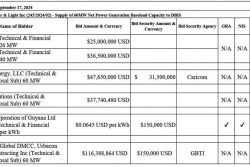TEHRAN, (Reuters) – Two suicide bomb attacks killed 39 people outside a mosque during a Shi’ite religious ceremony in southeastern Iran yesterday, a strike Jundollah rebels said was retaliation for the execution of their leader in June.
In a statement on its website, the Sunni Muslim group said it was responsible for the bombings outside the Imam Hussein Mosque in Chabahar, which also wounded more than 100 people.
“At least 39 people were martyred after two suicide bombings targeted Shi’ite mourners in front of a mosque in the town of Chabahar,” Fariborz Ayati Firouzabadi, head of the Coroner’s office in the province.
The bombings killed many children and women, who attended a Shi’ite religious ceremony to commemorate the death of Prophet Mohammad’s grandson Hussein, state television reported, adding that the death toll was expected to increase.
The poor province of Sistan-Baluchistan, near Iran’s border with Pakistan and Afghanistan, has been the scene of unrest with the mainly Sunni population claiming discrimination by the Shi’ite authorities.
Iran’s Interior Minister Mostafa Mohammad-Najjar told state television that the attackers had links to neighbouring Pakistan and that an investigation was underway.
“A group of terrorists who were trained in Pakistan carried out the bombings…we have informed Pakistani officials as well,” he said.
Jundollah meanwhile said the attack was in retaliation for the execution of its leader Abdolmalek Rigi.
“This operation was in revenge for the execution of the leader of the movement Abdolmalek and other martyrs of Jundollah who were savagely hanged,” the group said on its website.
It carried the names and photographs of two young men identified as the suicide bombers and said they targeted the “regime’s mercenaries and Revolutionary Guards”.
U.S. President Barack Obama, who has sought to engage diplomatically with Iran while pushing through tougher sanctions on Tehran over its disputed nuclear programme, condemned what he said was a “disgraceful and cowardly act”.
“The murder of innocent civilians in their place of worship during Ashura is a despicable offence, and those who carried it out must be held accountable,” he said in a statement.
U.N. Secretary General Ban Ki-moon also condemned the “abhorrent terrorist act” and offered his condolences, according to a statement released by his press office.
Iran has faced a string of blasts in past months, including two in June that killed 27 people in the same province. Jundollah had also claimed responsibility for that attack.
Bombings and clashes between security forces, ethnic Baluch Sunni insurgents and drug traffickers have increased in recent years in the area.
ENEMIES INVOLVED
Iran says Jundollah has links to Sunni Islamist al Qaeda and has accused Pakistan, Britain and the United States of supporting the group to stir instability in southeast Iran, home to Iran’s Sunni minority. The three countries deny backing it.
“America and the Zionist regime (Israel) try to create discord among Shi’ites and Sunnis by orchestrating such bombings,” said parliament speaker Ali Larijani, the semi-official Mehr news agency reported. “They should know that such measures will not go unanswered.”
The United States and Israel have not ruled out a military strike against Iran if diplomacy fails to persuade Iran to halt its sensitive nuclear work, which the West fears is aimed at building bombs. Tehran denies the claim.
Mahmoud Mozafar, head of the province’s Red Crescent, said his team had received a number of threats before the ceremony. “We were on alert in the past days because of some anonymous threats,” he told Reuters by telephone.
He said that according to his information more than 36 people were killed.
“Three terrorists entered Iran from a neighbouring country … One of them blew himself, another one was killed by police and the other was arrested while trying to flee Iran,” an unnamed Intelligence Ministry official told the IRIB website.
Iranian leaders reject allegations by Western human rights groups and Jundollah that the Islamic Republic discriminates against ethnic and religious minorities.
Ethnic Baluch, many with tribal links to their restive kin in neighbouring Pakistan and Afghanistan, make up an estimated one to three percent of Iran’s 77 million people.




